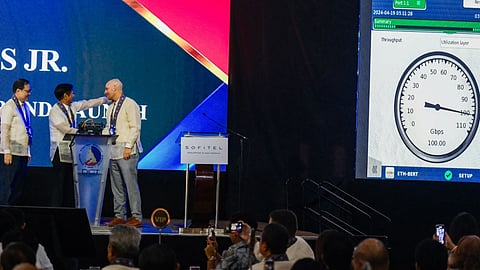
- NEWS
- the EDIT
- COMMENTARY
- BUSINESS
- LIFE
- SHOW
- ACTION
- GLOBAL GOALS
- SNAPS
- DYARYO TIRADA
- MORE

The Department of Information and Communications Technology (DICT) will set up more than 770 free Wi-Fi hotspots in Mindanao soon after President Ferdinand Marcos Jr. approved the P16.1-billion Philippine Digital Infrastructure Project (PDIP), which will improve internet access in rural places.
In a press briefing in Malacañang on Wednesday, DICT Undersecretary Undersecretary Jeffry Dy said PDIP includes setting up 772 free Wi-Fi spots in Mindanao, mostly in Caraga and Davao Regions.
The undersecretary said the free Wi-Fi speeds are expected to be capped at 50 megabytes per second (Mbps) “with room for 200 Mbps.”
Dy added that the Philippines is set to receive a $288 million loan from the World Bank to complete the project, aiming to bridge the digital divide and boost the country's economy.
"(The Philippine Digital Infrastructure Project) is the largest and actually the first of its kind in the Philippines for a loan for digital infrastructure," Dy said.
The project will focus on completing the national fiber backbone, with Phase 2 and 3 connecting Metro Manila to Southern Luzon targeted for completion this year. The loan will also fund the installation of submarine cables across Visayas and Mindanao, along with 772 free Wi-Fi sites concentrated in Mindanao.
"According to our research, for every 10 percent increase in internet penetration rate, it constitutes approximately 1.38 percent increase in our gross domestic product and that is the reason why this project is very important," Dy said.
"The reason why we're targeting regions in Mindanao is that even though the entire country has an internet penetration rate of 73.6 percent, approximately 86 million Filipinos have access to the internet – this disparity is larger in Mindanao," Dy added.
The project is expected to be completed by 2028, with the potential to bring down internet costs and increase speeds to match those of neighboring Southeast Asian countries.
When asked about the project's impact on cybersecurity, Dy said cybersecurity is also a major focus of the project since the Philippines is now ''significantly better'' when it comes to addressing cyberattacks.
The official mentioned that around 2,900 early signs of hacking attempts have been found in government bodies, such as local government units.
"For instance, the Anti-Child Exploitation Act mandates internet service providers to block child pornography sites. This project ensures that our free Wi-Fi sites can't be used for such purposes," Dy said.
"We'll also build a network operation center to monitor and defend against attacks on our sovereign network, especially the national fiber backbone," Dy added.
The DICT official also said that the Philippines, with around 118 million Pinoys, is only detecting 3,000 cyberattacks per year compared to Singapore, with approximately 6 million people, is detecting 18,000 attacks per year.
